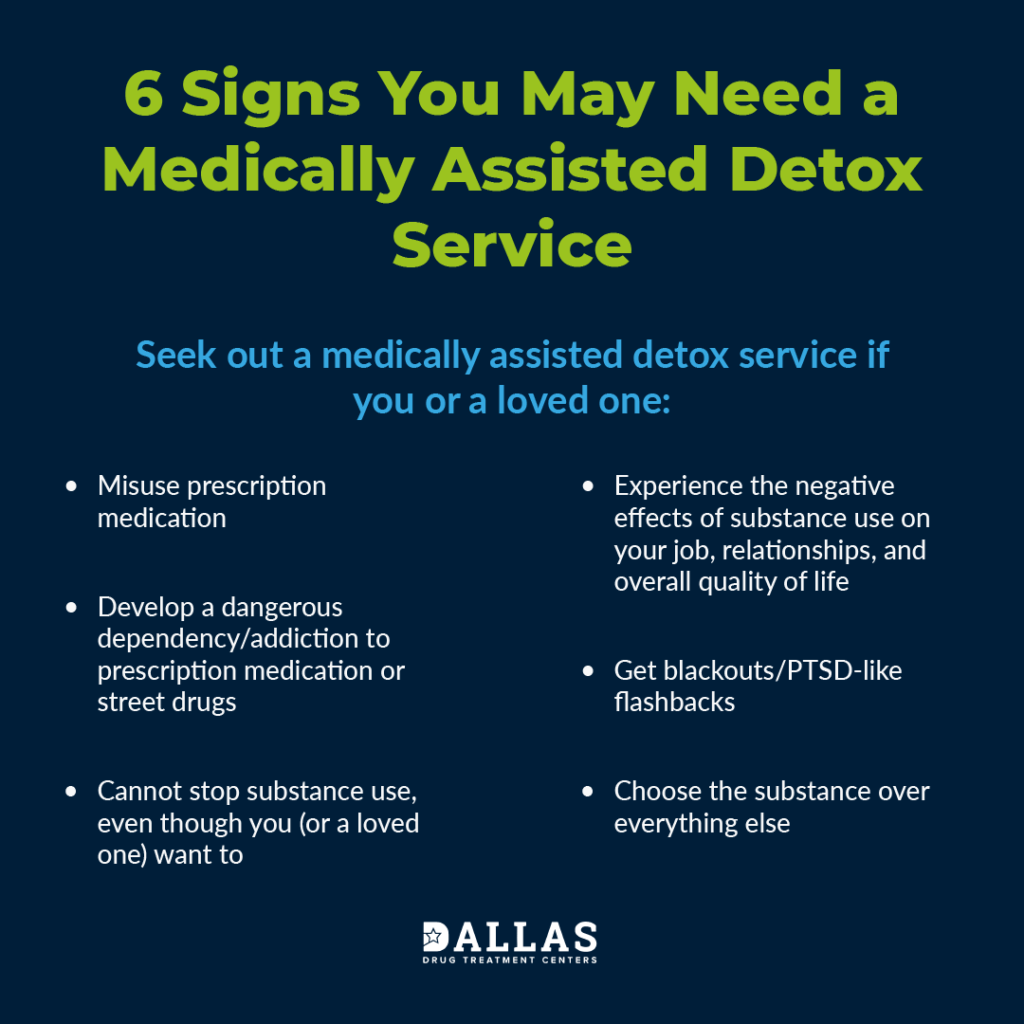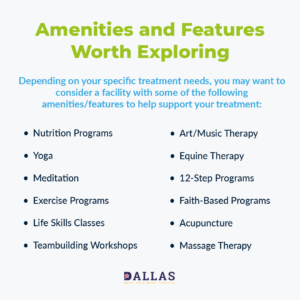How to Choose the Best Texas Rehab

It’s not easy to find the right rehab for yourself or a loved one. You want one that checks all the boxes. The good news? Learning how to choose the best Texas rehab isn’t nearly as hard as you might think. While there are many outstanding rehab facilities throughout the Lonestar State, choosing the best one will come down to your particular addiction, needs, treatment preferences, and priorities.
If you aren’t sure how to begin the research process, here are five tips to help you find the best Texas rehab for you or your loved one.
Do You Want to Stay Close to Home or Travel for Rehab?
It takes a lot of courage to decide to go to rehab. Now that you’ve chosen to make a positive change in your life, you’ll need to find a Texas rehab that’s right for you.
The first factor you’ll want to consider is whether you want to travel to a different part of Texas or stay close to home. Neither one is the better option—rather, it depends on your recovery preferences. If you’d like to benefit from the support of your family and friends throughout the treatment process, then you may want to look for a Texas rehab near your home. That way, they can visit you on designated visitor days. Conversely, if you’d like a break from your everyday environment to focus on your recovery, you may want to consider traveling for rehab.
Treatment Setting
Another thing you’ll want to consider is the setting of the treatment facility. Believe it or not, this can play a significant role in the rehabilitation process. Some rehabs are located by the beach, while others may be in the mountain or desert or city. No particular treatment setting is superior to another, but it’s worth choosing an environment you find most conducive to healing. For example, if you really like going on hikes, a mountain setting for rehab may make the most sense for you. It’s important to consider the activities you’ll want to engage in during treatment when guiding your decision.
Treatment Type: Inpatient vs. Outpatient
The treatment type you choose for you or your loved one will depend on several factors, including individual needs, preferences, and resources. There are two main program types: inpatient and outpatient.1 Both have benefits and drawbacks, so you’ll want to compare features, cost, intensiveness, and more.
Inpatient Texas Rehab
When you attend an inpatient Texas rehab, you reside at the treatment facility for the duration of the program. Treatment lengths may vary but tend to fall between 30 and 90 days. At an inpatient facility, you receive 24/7 structured care, away from your everyday using environment. You have the time and space to focus on your recovery without distractions, stressors, or triggers.1
An inpatient treatment setting is ideal if you:
- Were referred for treatment
- Have a history of relapse
- Have a history of dropping out of outpatient
- Have severe withdrawal symptoms
- Have a polydrug addiction
- Have a dual diagnosis
- Have a history of trauma
While there are many benefits of the structure that comes with inpatient treatment, there are some disadvantages, including:
- Lack of freedom to come and go as you please
- You’ll need to take time off from work
- If you have children, you’ll need to arrange care for them
- You have a set schedule that must be followed for the duration of your stay
- Insurance may only cover so many days before you must begin paying out of pocket
Outpatient Texas Rehab
When you attend an outpatient Texas rehab, you attend scheduled treatment sessions at a local center and return home when you are done. Sessions may include interventions like individual therapy, group counseling, or drug education. In this setting, recovery is more flexible and less structured than in an inpatient program.
An outpatient Texas rehab program may be beneficial if you:
- Have a mild addiction
- Have a strong support system at home
- Are very motivated to get sober
- Can’t take time off work or school
- Don’t have insurance or are on a budget
While outpatient treatment can be very effective for some individuals, there are also some drawbacks, including:
- You need to be ready to attend sessions regularly
- You may need to make arrangements for transportation
- You face more daily distractions from your environment
- It can be harder to work on and maintain recovery
- It may be harder to build the necessary support system needed to achieve/maintain recovery
Do You Need Detox Services?
Many individuals struggling with drug or alcohol addiction may need to receive detox services prior to beginning a substance abuse treatment program. Detox is a process designed to clear the body of drugs and toxins. A detox program includes medical care and support to help manage your withdrawal symptoms and achieve medical stabilization.1
Withdrawal from certain substances can be particularly distressing and even life-threatening, and medical detox is the safest route for those addicted to the following substances:3
- Alcohol
- Benzodiazepines like Xanax or Ativan
- Opioids like heroin, fentanyl, Vicodin, or Percocet
Medical detox programs include 24/7 care, oversight, and supervision to prevent and treat any medical emergencies that may arise, such as seizrues or delirium tremens.3 On the other hand, if you have an addiction to a difference substance or your addiction is mild, you may benefit from an outpatient detox program—just note that you won’t receive round-the-clock care as you would with inpatient detox.
If you’d like professional detox, make sure to take that into consideration when choosing a treatment setting—there are both outpatient and inpatient detox programs but outpatient should only be chosen for drugs that don’t typically cause dangerous withdrawal syndromes.
If you are looking for a program that offers detox services, we are here to help. Call us at 1(214) 935-2287 to find a Texas detox program near you. One of our caring and compassionate treatment support advisors will assist you.

Do You Need a Specialty Rehab?
Some Texas rehab programs specialize in treating addictions to certain substances, such as opioids, while others specialize in providing integrated care for substance addictions and co-occurring mental health disorders, also known as dual diagnoses.
Comorbid disorders are very common—nearly 38% of adults with a substance addiction also have a mental illness like depression, and just over 18% of adults with a mental health disorder also have a substance use disorder.2 Co-occurring disorders require specialized care because the interactions between conditions can exacerbate the course for both.
If you know that you have both an addiction and a mental illness, such as post-traumatic stress disorder (PTSD) or bipolar disorder, you’ll want to look for a dual diagnosis rehab in Texas that offers comprehensive, integrated treatment that adequately addresses both conditions.
Other specialty Texas rehabs include those that cater to the needs of specific populations, such as:
- Teens
- Women
- LGBTQIA+ community
- Veterans
The needs of members of these populations may be different from others, so it’s important to find a rehab that can tailor treatment toward your individual situation. Plus, many people feel more comfortable in an environment with others who know what they are going through. For example, a member of the LGBTQIA+ community may feel safer at a rehab center that only treats members of this population, as it reduces the risk of experiencing homophobia or transphobia.
What Amenities and Features Do You Want?

Every Texas rehab offers different amenities and features. For example, some rehabs offer an upscale, resort-like experience whereas others are more traditional. Some treatment programs follow a 12-step model and integrate spirituality and 12-step meetings into treatment, while others are strictly secular and may include SMART Recovery meetings.
As you think about your specific rehab needs, it’s essential to consider what you’d like to have access to in order to help make your experience as comfortable and fulfilling as possible. If you enjoy working out and will want to continue exercising during treatment, you’ll want to find a Texas rehab that has an on-site gym or trails to run on. If diet and nutrition is important to you, make sure the treatment facility offers nutritional counseling and even chef-cooked meals.
If you are looking for a holistic approach to addiction recovery, you may want to seek out a treatment facility that includes amenities such as:
- Yoga sessions
- Acupuncture
- Meditation classes
- Massage
- Art therapy
- Music therapy
- Equine therapy
If you’re looking for a more intimate setting, you’ll want to consider a rehab that has a more private, residential feel. For those who want a scenic setting to recover in, you may want to look for rehabs by the beach or in the mountains.
Amenities and features like these will allow you to enjoy the benefits of treatment while also having a comfortable, calming experience. The best type of rehab program is one that is the most rejuvenating and healing for you.
Do You Have Insurance?
Finally, when trying to choose the right Texas rehab for you, you’ll want to consider whether you have an insurance plan that covers addiction treatment and substance abuse services. Most private insurance plans provide some sort of coverage, whether it’s outpatient treatment or inpatient rehab, although some may have a deductible or a co-pay. If you do have insurance, then you’ll want to choose a Texas facility that is in-network. You can find these by logging into your insurance account and browsing treatment facilities or by calling the number on the back of your card. If you choose an out-of-network rehab, then you’ll have to pay for treatment out of pocket.
If you don’t have insurance, there are a few methods to help you keep the costs of treatment down, including:
- Sliding scale centers
- Payment plans
- Grants
- Scholarships
- Crowdfunding
- Healthcare loans
- Paying via credit cards
If you need help finding a rehab program in Texas, call our helpline at 1(214) 935-2287. We will help you find a facility that will work with your financial situation and ensure you get the help you deserve.
Resources
- National Institute on Drug Abuse. (2021, June 10). Treatment approaches for drug addiction drugfacts.
- National Institute on Drug Abuse. (2018). Comorbidity: Substance Use and Other Mental Disorders.
- Center for Substance Abuse Treatment. Detoxification and Substance Abuse Treatment. Treatment Improvement Protocol (TIP) Series, No. 45. HHS Publication No. (SMA) 15-4131. Rockville, MD: Center for Substance Abuse Treatment, 2006.
